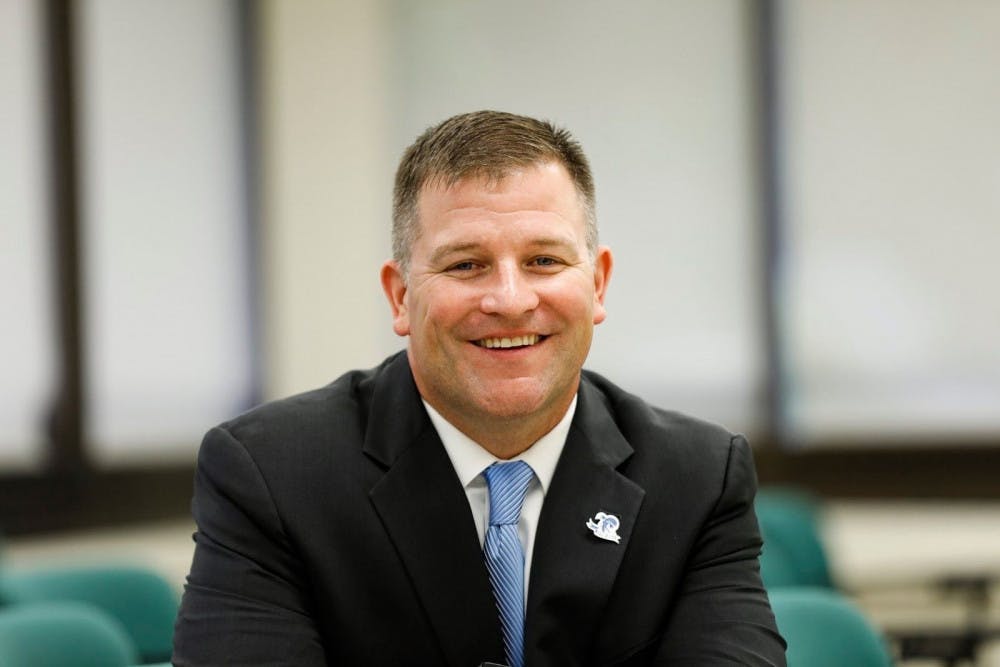The mental side of sports has always been a subject of debate in terms of its value and legitimacy. Some shrug it off as a poor excuse for bad performances or lack of talent while others claim it to potentially be the most important aspect of modern sports.
Dr. Bryan Price falls into the latter group. A former Division I baseball player and coach at the U.S. Military Academy at West Point, Price has dealt with the pressures of being a top collegiate athlete and on a team that constantly fought to win titles. West Point’s performance psychology program gave him his first insight into the world of sport psychology as they used it to develop their cadets’ ability to perform under intense pressure.
Using similar practices, Price created his Top Mental Game program for collegiate and high school athletes across all sports. The program includes visualization and goal setting exercises, but it also provides biometric feedback as a way of showing the athlete or team their physical improvement when using these tactics.

(Photo courtesy of Bryan Price)
“It’s about helping people perform under pressure,” Price said. “No matter what you do, no matter what your profession is, you’re going to get nervous. I help people perform under pressure and give them the tools to cope with the pressure of sports.”
Even before Top Mental Game was a fully functioning program, the principles of its foundation proved to have merit in Price himself. He was named to the Patriot League's All-Decade Team (1990-2000) after leading West Point to their first-ever Patriot League Championship in 1997. After returning to the team in 2010 as an assistant coach, Price refined West Point’s Center for Enhanced Performance and helped the baseball team win their seventh Patriot League Championship in 2013.
In 2019 Price implemented his curriculum into Seton Hall athletics. His work with the school started with just the women’s golf team, but it has since expanded to the baseball team and several student-athletes on an individual basis across the other athletics programs.
Almost immediate improvement was seen within the women’s golf team’s performances as they won the Princeton Invitational and had top-four finishes in their six other tournaments before the COVID-19 quarantine. Mia Kness, a senior on the team and Seton Hall's Female Athlete of the Year for 2019-20, has worked with Price since her sophomore year on such aspects as visualization and goal setting.

(Photo courtesy of Bryan Price)
“Every season we send [Coach Natalie Desjardins] our goals, and we hold each other accountable to those goals,” Kness said. “Whether it’s as simple as getting eight hours of sleep a night or going to practice on your game six days a week, that was what was so good about our team last year. We worked so well last year because we were all on the same page.”
Kness emphasized Price’s suggestion of maintaining accountability for achieving a “big hairy goal,” or a long-term goal to build towards throughout the season. The Big East Tournament title was and still is their goal, and the return of three of their four seniors from last year only rejuvenated the hunger to achieve that goal this year.
Rob Sheppard, head coach of the baseball team, also bought into exposing his team to the idea of improving their game even if it wasn’t on the field. Baseball, as he put it, has a lot of downtime, and therefore requires intense focus in short spurts throughout a game.
One of the most important aspects the team continues to work on is developing team comradery to be able to hold each other accountable to a certain standard.

Photo provided by Dr. Bryan Price
“We did a number of exercises last fall that made guys understand their individual approach to how they work out and show up,” Sheppard said. “It also showed them that the way they go about their business can have an impact on their teammates and that they can ask each other to do the same thing.”
Jonathan Luders, a rising sophomore on the baseball team, has worked with Price since he arrived at Seton Hall. As a psychology major, the idea of working with Price to improve the mental side of his game was a no-brainer. Luders learned the most from using the biometric feedback tools to provide visuals of how his body reacted in certain scenarios.
He also touched on Price’s ability to individualize the program to fit each athlete’s needs. Luders, for example, focuses on breathing techniques during the game then relies on visualization prior to and after each game.
“I think if you can incorporate any mental training into your game, it’s going to make you better no matter what,” Luders said. “It’s all about the breathing. You’re not going to be able to stay focused the entire time, but it helps you stay focused at every pitch.”
The key across each of these sports and athletes is consistency. Routine is crucial to developing that top mentality. It’s a process Price calls mental skills conditioning, and its importance continues to grow with increased pressure placed on young athletes.
“There’s more pressure on athletes to perform at a higher level at younger ages,” Price said. “What hasn’t kept pace is the mental skills needed to cope with that pressure, and that’s the gap I’m filling.”
Justin Sousa can be reached at justin.sousa@student.shu.edu. Find him on Twitter @JustinSousa99.





